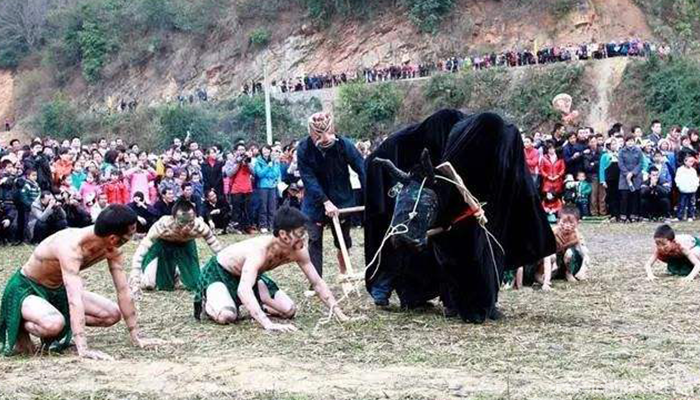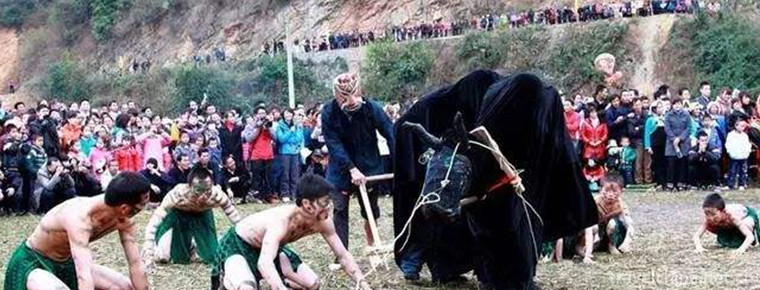Add another festival beside the word ants of the Zhuang nationality
Add another festival beside the word "ants" of the Zhuang nationality
The Zhuangs Ant Festival (insect word plus another) is mainly prevalent in the Hongshui River Basin in the northwest of Guangxi Zhuang Autonomous Region. It is named "Ant (insect word plus another)" by the Zhuangs. It is also called "Frog Mother's Day" and "Frog Festival". This is a relic of frog worship by the ancestors of the Zhuang nationality. Zhuangzu villages along the Hongshui River pray for good weather, plentiful grain and flourishing human and animal life by worshipping frogs.
As for the Zhuangs Ant Festival, there is a story among the people: in ancient times, there was a filial son named Donglin in the Zhuangs family. When his mother died, the frog kept crying outside the house. He was afraid that his mother's soul would not be peaceful and he drowned the frog with boiling water. As a result, frog sounds were cut off, people suffered from drought and no grain harvested. Donglin knows he made a big mistake and killed "Tiannu" by mistake. They decided to make amends, bury the "Heavenly Lady" thickly, and take the "Heavenly Lady" back to the village every January to celebrate the festival. Thus formed the ancient and unique Frog Festival of the Zhuang Nationality. Therefore, when the Spring Festival arrives, people in the Zhuang Village will spontaneously hold a grand and enthusiastic Anthem song around the Ant Pavilion (insect Pavilion plus other) around the Ant Pavilion (community pavilion).
The ceremony of the Zhuangs Ants Festival is not the same everywhere. The Festival period usually lasts from the beginning of the New Year to the end of the second day of February. There are three procedures in the whole process: looking for frogs, filial piety frogs and burying frogs. They are generally divided into five parts: looking for frogs, traveling stockades, offering sacrifices to frogs, burying frogs and checking divination. In some areas, there are also men and women with frog masks, frog gods, frog generals and other gods dancing different kinds of dances.
During the festival, people take the sacrifice of frogs as the main activity, beating gongs and drums, gathering singers from all over the country, dressing up in festival costumes, gathering happily and singing everywhere.
On the first day of junior high school, men, women, old and young in full dress went out, beating gongs and drums, and flocking to the hills and paddy fields to look for frogs. Because frogs are still hibernating, people have to turn over rocks, dig fields and dig holes. When the first man found the frog, he fired a gun to reward him. He will be honored as the Zhuangzu Ant Lang (beside the word insect plus another Lang), and he will organize all the activities of the festival. The crowd came quickly to congratulate the frog.
From the second to the fifth day of junior middle school, people have prepared a small coffin, which is covered with a small Bamboo-Woven paper floral building. Place the frog in the floret. During the day, four teenagers carry flower towers and small coffins, followed by villagers, to various villages to parade, home-to-home New Year's greetings, this is called "You Zhai".
At night, when you came back from the village, the villagers parked the flower towers and coffins on the pavilion beside the village. Near the pavilion stood a bamboo pole or a Chinese fir pole more than ten meters high, with a flag painted with frogs hanging at the top, and paper bundles in red, white and blue hung around it. The whole village people automatically gathered at the small pavilion where frogs were parked to burn incense, to observe funerals for them, to offer sacrifices, and to sing a mountain song of praise to frogs all night long. This is called "sacrifice to frogs", also known as "filial frogs". The contents of folk songs include narrative songs (the origin of Frog Festival, the formation of villages, where ancestors came from), production songs (farm songs), love songs.
The funeral of frogs on the last day of the first month is also the climax of the festival. Each house slaughters chickens and kills ducks and cooks five-color glutinous rice. After lunch, people carried small coffins and flower towers in front, followed by a long funeral procession. The whole village sent the frog to the graveyard which had been chosen beforehand, digging pits, burying, burying and firing firecrackers, just like funeral and funeral rituals for relatives. This is called "burying frogs".
After the funeral, another insect (beside the word insect) Lang opened the coffin of frog buried in the first year to test the bone to know the agricultural harvest of that year. The golden skeleton symbolizes the good weather and good luck of the year; if the skeleton is black or gray, it indicates the bad year, reminds people to pay attention to flood control and drought prevention, and holds a certain ceremony immediately to pray for disaster relief and ensure a bumper harvest and tranquility. This is called "divination".
Frog dancing is mostly simulated by frog dancing. Its main movements include squatting on both legs, holding sticks on one's back, running through broken steps, and lifting chattering points. It is full of life flavor and humor.
The people of the Zhuang nationality regard frogs as heavenly daughters descended from heaven. She will "call for wind and rain" and bring prosperity, auspiciousness, peace and prosperity to Zhuangxiang.
The artistic image of frogs is widely seen in the paintings, sculptures, tattoos, embroidery, dances, folk songs and legends of the Zhuang people in Guangxi. The main image in the famous Huashan Cliff paintings is also frogs. Many scenes in the painting depict sacrificial activities of ancient chiefs and wizards dressed as frog totems.
In Zhuangxiang, where rice is the main crop, good weather is the key to a good harvest of rice. "Frogs are dumb, the seedlings are dead", "Frogs croak, heavy rain is coming". According to the experience of seasonal climate change, the ancestors of the Zhuang nationality believed that the thunder in the sky and frogs on the ground would bring abundant rain to the farmland and hope for a bumper harvest. Here, the frog is the agricultural God of the Zhuang nationality.
Frog Festival is popular in Zhuangjia villages on both sides of the Hongshui River for more than 100 miles. In history, two or three hundred insect pavilions have been built. Because of historical reasons, in the 1960s and 1970s, Frog Festival was seldom held. Some Mao (insect word plus another) pavilions were destroyed at that time, and now few are left behind.
After the reform and opening up, the activities of Frog Festival have been restored in various places. At present, young people are increasingly indifferent to traditional folk cultural activities. Some of the inheritors of these activities have withdrawn from the stage because of their old age, and some of them have died one after another, resulting in some skills not being inherited. Relevant departments are taking measures to rescue and protect the relevant folk activities of Frog Festival.


-
2.Taining Scenic Tourist Area
Taining Scenic Spot: World Geopark, National AAAAA Class Tourist Spot, National Key Scenic Spot, National Forest Park, National Geopark, National Key Cultural Relics Protection Unit
Time 2018-12-08 -
3.Shanghai Happy Valley
Shanghai Happy Valley is located in the Songjiang Sheshan National Tourism Resort in the southwest of Shanghai. It is 40 kilometers from the central area of Shanghai
Time 2018-12-19 -
4.Eight Immortals Crossing the Sea Scenic Area
Eight Immortals Crossing the Sea Scenic Area, also known as Eight Immortals Crossing the Sea and Eight Immortals Crossing the Haikou, is situated on the shore of the North Yellow Sea in Penglai City
Time 2018-12-23 -
5.Liupanshan National Forest Park
Liupanshan National Forest Park is located in the center of the triangle formed by Xi'an, Yinchuan and Lanzhou. It is located in the south of Ningxia. It spans two counties and one district in Jingyua
Time 2018-12-24 -
6.Haimen mountain song
Haimen Mountain Opera is a traditional opera popular in Haimen area of Nantong, Jiangsu Province. It originated from Haimen Mountain Song and developed into
Time 2019-05-02 -
7.Beijing embroidery
Beijing embroidery, also known as palace embroidery, is an ancient Chinese traditional embroidery technology, the general name of embroidery products centered on Beijing. Ming and Qing
Time 2019-05-07 -
8.Larenbu and Jimenso
With vivid images, deep and solemn language and singing form, Larenbu and Jimenso described the love tragedy of the poor Larenbu and the pastor's sister Jimensoe, who developed from employer relations
Time 2019-05-10 -
9.Mongolian camel ball
The intangible cultural heritage is the manifestation and cultural space of various traditional cultures which are inherited from generation to generation and closely related to people's life.
Time 2019-06-04 -
10.Left Foot Dance of Yi Nationality
The left foot dance of the Yi people, which is called "Gouzha" in the Yi language, falls to the left foot. Dao Guangnian's Dingyuan County Chronicle says, "It's called falling on the le
Time 2019-07-13 -
11.Guangxi drama
One of the local operas of the Zhuang nationality in Guangxi. Yongju Opera belongs to the Pihuang Vocal Tune System, which originated in Hunan. It was formerly called Guangju Opera, Old Opera, Local O
Time 2019-07-14 -
12.Dazhou peoples life
In 2018, the per capita disposable income of Dazhou residents was 20881 yuan. The per capita disposable income of urban residents was 30882 yuan, an increase of 8.8%. Among them, salary income was 17597 yuan, an increase of 7.3%; net ope
Time 2020-12-20